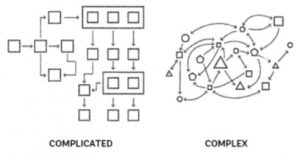Oversight Ministry: What we have learnt
A recent national conference on Oversight Ministry complemented ongoing research by a small group from the Diocese of Truro. Dr Jonathan Rowe, Director of Ministry, was asked what we have learnt so far from the conference and research.
Why is Oversight Ministry on the agenda?
The bishops’ vision is that the whole People of God are involved in ministry, responding to God’s call and sharing our gifts. The implementation of this positive vision is urgent given the declining number of stipendiary clergy: we just can’t continue as we have done — which is a good thing.
What is Oversight Ministry?
It’s not about doing traditional ministry faster in more places! At root it’s about exercising ministry through and with others rather than taking on the responsibility for doing everything oneself.
Is it about structures or the way we do things?
The style of Oversight Ministry is what makes it distinctive, although in practice it’s also about ‘form’, the way we are organised. Oversight Ministry requires a collaborative style, but Oversight ministers will be employed within an institution. This may create tensions, since a key characteristic of Oversight ministry is that it is only exercised in teams and in context: one cannot be an oversight minister in splendid isolation.
Does the way we think about how we are organised affect our view of Oversight Ministry?
Of course. An insight from Stanley McChrystal’s book Team of Teams was shared at the conference. McChrystal says that we often think the world is complicated and so try to organise our way out of difficulties with more structure and greater efficiency. He tried this in Iraq when he was commander there, but failed. McChrystal came to see that he was trying to solve the wrong problem because his diagnosis was incorrect: the world is not complicated, but complex. He realised the need was not to create more efficient hierarchies, but to nurture connections between many interconnected people, each with multiple and unpredictable links to others. This picture from McChrystal’s book may help:
If we think about Oversight Ministry in these terms, the key tasks are obvious: to resource others and nurture connections.
Can we encapsulate Oversight Ministry simply?
We have tried to do this, but keep coming up against complexity — no one image captures everything we want to say. This is true of all metaphors, though, so here are a couple of suggestions:
- Rather than ‘shepherd and sheep’, a traditional image for priest and church, Oversight Ministry is more akin to being a farm manager
- Rather than church as a cruise ship, where the crew do all the work and the passengers enjoy themselves, Oversight Ministry is like a merchant ship, where all are involved.
You will see that the work on an appropriate metaphor that captures the focus upon each part of the body of Christ working together is not yet done — all ideas welcome.
So is it a new way of doing things or just reinventing the wheel?
It might be a very old way of doing things. For example, the early church had a community of leaders, the apostles, and St Paul often encourages all to exercise their gifts. But this has not been the way the Church of England has worked for many decades. Even ‘Team Ministry’, with its clerical focus, is not the same. So Oversight Ministry, perhaps under another name, is something that needs fresh attention.
Has anyone got experience of Oversight Ministry?
Lots of people have, although not necessarily with this title. We asked The Revd Alyson Buxton, Rector of Boston, Diocese of Lincoln, to speak to the conference of her experience of overseeing up to 25 churches. Her first priority, which provides clarity for her vocation, is to be a worshipper and a disciple of Christ. She also shared that being authentic has been essential to being effective as a leader.
Alyson’s experience was that Oversight ministry involves being a ‘cultural architect’, shaping communities; and that a significant element of the role involves the symbolic, the discernment of when to be present among a community. More obvious aspects of Oversight Ministry include planning and people.
What are the challenges of exercising Oversight Ministry?
An Oversight Minister will lead teams that have strengths and weaknesses. This can be messy since one becomes the holder of everyone’s expectations; and at times become the scapegoat. It requires mental and emotional resilience, but it is important to remember that the overseer is also an accompanier. As Alyson reminded us, Gregory the Great wrote, “the priest is with the people when they face a storm in the soul”. The picture is one of the Oversight minister as navigator.
Who might be an Oversight Minister?
Anyone who has the necessary skills and character. The research group identified some requirements using the Church of England’s selection and formational criteria. I won’t list them all here but, as an example: ‘Vocation and Ministry’ – Oversight Ministers should be able to articulate a positive vision for oversight ministry, seeing it as a specific calling to open up and enable opportunities for all disciples, rather than driven primarily by pragmatic factors or an opportunity for ‘solo-heroic’ leadership.
Is Oversight Ministry a priestly vocation or open to lay people, too?
The research group in Truro was clear that the Oversight Ministry could be exercised by lay or ordained in a team of both lay and ordained ministers. In the near future, though, most Oversight ministers are likely to be priests. This does raise questions about the relationship between Oversight Ministry and the sacraments, questions that certainly need to be explored further.
What should dioceses be doing to ensure successful Oversight Ministry?
First of all, dioceses need to be open both to doing things differently and to new ideas emerging ‘from below’ as well as from Bishop’s Staff teams, since successful change is often organic and achieved when energy and drive comes from participating churches.
Second, special attention needs to be paid to moments of transition (sometimes called interregna or clergy vacancies). These provide excellent opportunities to work alongside parishes and benefices to help them discern their vision, aspirations and callings, which the diocese can then support.
Third, it may be important to ‘think big’. Canon Keith Lamdin, Principal Emeritus of Sarum College, noted that the typical experience of vicars/rectors is that leading one to two churches is relatively straightforward, three to six churches is difficult (and if they adopt the traditional model can lead to burnout), but that once there are more than six churches a different approach is absolutely necessary. So dioceses might need to cluster upwards of ten parishes (perhaps with more than one stipendiary priest/other leader, mind you) to create the right conditions for effective Oversight Ministry.
Finally, learning from McChrystal, dioceses can work with clusters to resource individuals and churches for ministry and nurture the connections between them. Done properly, that forms quite an agenda.
How could we train people for Oversight Ministry?
The Revd Dr Emma Ineson, Principal of Trinity College, Bristol, spoke to the conference about the formation of Oversight ministers in the context of church of God. Ultimately, of course, God does the formation. According to Acts 20, our part is to watch over ourselves and others with the help of the Holy Spirit. Part of the motivation to do this comes from understanding ourselves as part of what God is doing. So helping potential Oversight minsters reflect upon God, the world and the Gospel as a way of enabling them to comprehend their calling to enable all God’s People is the first and foundational way in which people are to be trained for Oversight Ministry. Emma referred to the recovery of the ancient emphasis upon character formation through Christian practices, which should now lead us to very fruitful work around the spiritual, pastoral, leadership, and practical practices of Oversight Ministry.
Is Oversight Ministry open to the charge levelled at other recent church initiatives that it is ‘theology lite’?
No. Obviously, it’s possible to do anything in the wrong way. And it would be perfectly possible to think ‘non-theologically’ about Oversight Ministry. But if we refer to Scripture, tradition, reason and experience as we keep ‘God in view’, we will guard against this particular charge. At the conference, Dr Tim Ling, Head of Ministry Development in Ministry Division, referred to how Polycarp engaged with messiness and complexity, holding open the possibility of inclusion and reconciliation as he wrestled with how to lead the church as it left behind the era of the first disciples. We now, in our discipleship, are called to do something similar: Oversight Ministry, rightly conceived and practised, is part of our response.







